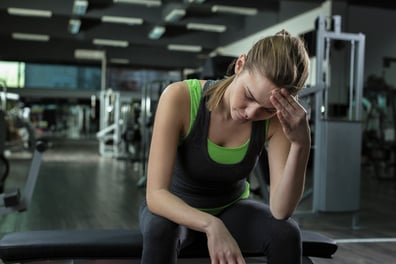 Have you ever woken up feeling like a truck ran you over? This might be due to an underlying illness; whether it be a cold, flu, bronchitis, or some other bug, it seems to happen to everyone at least once per year. When it comes to fitness, we sometimes have to make a choice: “Should I work out or should I rest?” The answer to this is not as cut and dried as it might seem. We’ll look at when it’s a good idea to stay home and chill and when you can just “sweat it out.”
Have you ever woken up feeling like a truck ran you over? This might be due to an underlying illness; whether it be a cold, flu, bronchitis, or some other bug, it seems to happen to everyone at least once per year. When it comes to fitness, we sometimes have to make a choice: “Should I work out or should I rest?” The answer to this is not as cut and dried as it might seem. We’ll look at when it’s a good idea to stay home and chill and when you can just “sweat it out.”
Making the Call: Should I Cancel My Workout?
Sometimes just keeping up with your daily routines can help you feel better, especially as you move through the day. You might even pick up energy from exercise and activity instead of staying idle at home. A few guidelines dictate whether you should green-light a workout. According to experts, a major factor to consider is body temperature. Having any kind of fever is an immediate red flag, especially at more than 101 degrees. Another obvious red flag is if you are unable to keep fluids down. Anytime you are dehydrated, your body does not function at peak capacity. Here are some additional ideas to help make the decision.
Going Back to Working Out After Being Sick
When you feel like you are ready to go back to the gym, try to ease into your workout. Your body (namely your T-cells) has been fighting a battle. A quick assessment of your symptoms should give you a good indication of whether you are good to go. Temperature, fluids, and blood pressure are all surefire ways to draw that line in the sand.
How to Keep from Getting Sick Again
Finally, you should hopefully, at this point in your life, understand the importance of illness prevention—not only for you, but also for those around you. The routine of washing hands wasn’t widely practiced until about 150 years ago when a Hungarian doctor named Ignaz Semmelweis discovered that when his crew washed their hands between patients, the number of diseased and dying patients dropped off immediately. The long forgotten disease, puerperal fever (sometimes known as childbed fever) was nearly eradicated by simply implementing a hand-washing regimen. Today’s world allows almost endless opportunities to not only transmit illness, but also prevent them. Enough history lessons, though. You get the point: wash your hands often, please.
Ask for Help from the NIFS Staff
NIFS staff can help you in a number of ways, especially when deciding whether exercise is right for you when you are not feeling well. Blood pressure monitors, both electronic and manual, as well as an oxygen sensor are available to all members. A well-stocked first aid kit and a staff well versed in first aid and safety are also on your side. Always remember, your workout is important, but your health is priceless.
Muscleheads evolve (and rejoice)
This blog was written by Thomas Livengood, NIFS Health Fitness Instructor and Personal Trainer. To read more about the other NIFS bloggers, click here.

